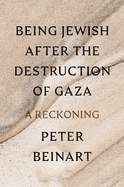
Readers seeking a measured, globally contextualized understanding of the Israel-Hamas war will find much to ponder in Peter Beinart's Being Jewish After the Destruction of Gaza: A Reckoning. With characteristic directness, Beinart explains that his book is about "the story Jews tell ourselves to block out the screams," a narrative that allows Jewish people to justify the horrors committed in their name.
Beinart (The Crisis of Zionism; The Good Fight) is a New York Times columnist, professor of journalism and political science at the City University of New York, and editor-at-large of Jewish Currents. His family came to the U.S. as immigrants from apartheid South Africa. A steadfast promoter of equality over supremacy, he describes risking "excommunication" from his cherished American Jewish community to voice a new narrative of liberation created by abandoning the oppression of another people. Beinart employs historical examples, such as white people in the American South during Reconstruction who "considered racial equality a monstrous delusion," and Northern Ireland's Protestants who "were terrified" of sharing power with their Catholic neighbors, to illustrate political scientist Mahmood Mamdani's assertion that, over time, "inclusion yields safety" while domination breeds violence.
At the core of the disconnect between the atrocities being committed in Gaza and the apathy of "Jews in Israel and the diaspora," Beinart posits, lies a belief in the "collective victimhood and moral infallibility" of the Jewish people. Yet Beinart believes that this contradicts what "sacred texts say about Jewish ethical responsibility" and the dangers of "unchecked power."
Beinart takes comfort in "the metaphor of Jews as a family," despite deep ideological divisions, and is persuasive in his conviction that shedding the burden of occupation will make way for a new Jewish story. --Shahina Piyarali

